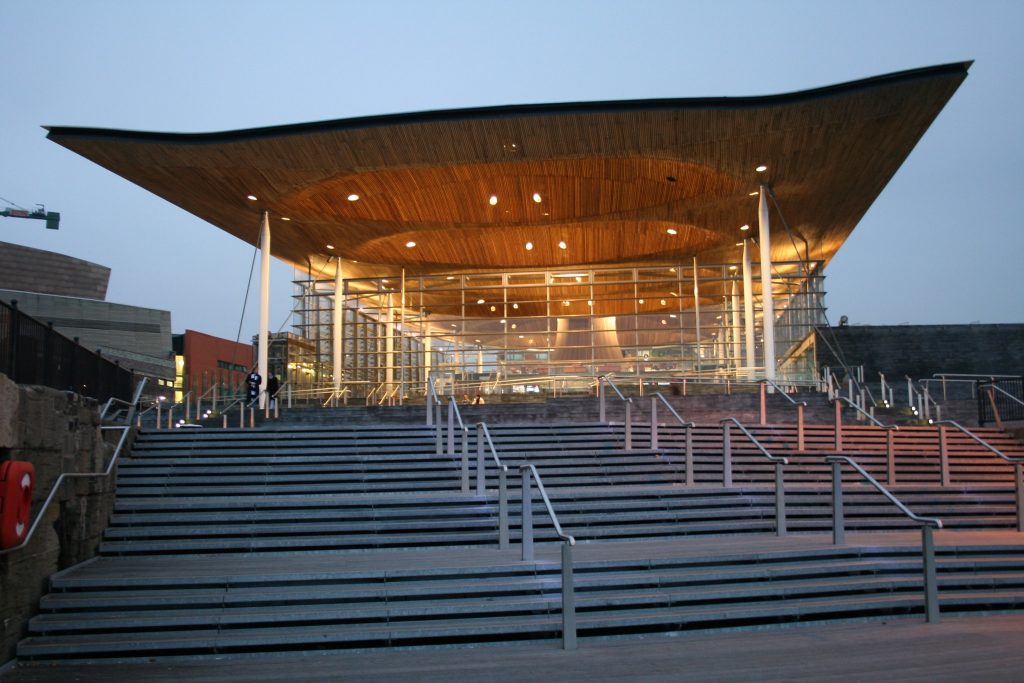Misinformation inquiry commitments, funds to support Welsh media and devolving broadcasting; Andy Regan dissects the parties’ proposals.
As Wales’ response to the coronavirus pandemic differentiated itself from other UK countries’, questions once again emerged about the strength of the media in Wales and whether people were adequately informed about where power lies in the UK.
And over the last five years, social media misinformation and disinformation has emerged as one of the most important issues facing any democracy in the modern age.
Yesterday, we published our Media Priorities for the next Senedd, and we asked Wales’ political parties four Big Questions on issues facing the country over the next few years.
We asked the parties standing in the 2021 Senedd elections specific questions around our priorities; and you can read their responses here. Below is an analysis by the IWA team of the responses received.
Big Question 1: Funding Welsh Media
The democratic deficit in Wales’ media remains an issue, despite some positive progress over the last five years. The IWA believes the next Welsh Government needs to do more, starting by creating a contestable fund for independent news of at least £1m per year.
Would your party take forward this proposal in government? What other steps would you take to support Wales’ media?
How would you engage with the development of this new body in opposition?
We first began discussing the idea of a contestable pot of funding for news at our 2021 Media Summit.
Since then we’ve been pleased to see momentum building behind the idea, including an endorsement by the Senedd’s outgoing Culture, Welsh Language and Communications committee in their report on the Devolution of Broadcasting. There have also been supportive comments from outgoing Ministers, as reported by Nation.Cymru.
We are therefore delighted, but not surprised, to see unanimous support in principle for such a fund, and an arm’s length body to administer it.
All five parties who responded were clear that they supported such a move – though with different nuances, such as the Wales Green Party’s emphasis on supporting not for profit media organisations.
“No party has explicitly endorsed our proposed budget of at least £1m per year.”
Plaid Cymru have set out an arguably more wide-ranging approach to the question of media in Wales, with their proposed Commission, though they made clear (in response to a follow up enquiry) that they would also support a news fund.
No party has explicitly endorsed our proposed budget of at least £1m per year. So we want to briefly explain why we believe this is a realistic figure.
At present – and as highlighted in Welsh Labour’s response – the Welsh Government does provide some direct and indirect support for a number of news organisations, including via the Books Council for Wales (BCW)*.
This includes support for the successful Welsh language news website Golwg360, which has an annual budget in the region of £200k, and the one-off Independent Community News Fund (ICNF) in 2019, which again had a budget of £200k.
We therefore concluded that a budget of £1m would allow the next government to build on existing support, potentially funding one or two websites with similar levels of resource to Golwg360, replicating the support provided by the ICNF, and then also doing significantly more.
Activities it could fund might include dedicated Senedd or local government reporters, or syndicated news packages which would report UK level news through a devo-aware editorial lens.
Crucially, the new fund should shift from an approach of funding predetermined activities – such as a particular kind of website, or approach to journalism – and instead adopt an outcome-focussed approach, allowing innovation to be led by journalists identifying gaps in provision.
Gofod i drafod, dadlau, ac ymchwilio.
Cefnogwch brif felin drafod annibynnol Cymru.
We accept that designing such a fund will be far from simple, and the IWA would be keen to support the next Welsh Government in making it a success.
One key area for future research will be whether Wales’ news landscape does indeed constitute a market failure, or whether profitable business models which deliver poor quality journalism could be competed-out of the market by higher quality alternatives over time.
This will affect whether the Welsh Government takes the approach of committing to a ‘put money in, get news out’ for the medium to long term, or whether the fund can take the approach of helping organisations become self-sustaining.
[*In the interests of transparency, it is fair to note that the IWA gratefully receives an annual grant from the BCW. This contributes to the cost of the online and print versions of the Welsh Agenda. We consider these to be primarily platforms for comment and debate, stories of life in Wales, and cultural articles, rather than news or investigative journalism.]
Big Question 2: Devolution of Broadcasting
We believe there is a clear gap in accountability of Public Service Media organisations (PSMs) to the Senedd around broadcasting. There should be further devolution of broadcasting policy, but this should be developed through constructive engagement with the UK government, seeking to identify specific changes for specific goals.
Would your party support further devolution of broadcasting? If yes, what specific aspects of policy should be devolved as a priority, and to what end? If no, what other steps would you take to improve accountability of PSMs to the Senedd?
Debate on this question has raged for some time now, and commitments to reform fall broadly on a spectrum consistent with parties’ wider stance on new powers.
The Welsh Conservatives are unsurprisingly against devolving broadcasting, given their ‘no new powers’ stance, and commitment to resolving issues by working constructively with the UK government is a core theme of their wider election messaging.
They do not offer details on what specific avenues the two governments would explore to approve accountability, though they clearly recognise the underlying issue.
Labour take a fairly sceptical stance about further powers, pointing to improvements that have already been made, particularly around Ofcom’s accountability to Wales.
They advocate what could be seen as a ‘best of both worlds’ approach with a clear unionist flavour, and – like the Conservatives – they allude to other ways of strengthening accountability without being particularly specific.
The Lib Dems, Plaid and Greens all offer a clearer commitment to devolution, and list a number of specific areas of focus. Plaid unsurprisingly go furthest with a call for a standalone broadcasting and telecommunications regulator for Wales.
“Plaid and the Greens also both advocate an approach of regulating or imposing levies on large streaming providers – the so-called ‘Netflix tax’”
Plaid and the Greens also both advocate an approach of regulating or imposing levies on large streaming providers – the so-called ‘Netflix tax’ which has been used to raise funding for domestic productions in EU member states.
Recent polling doesn’t suggest there is much prospect of a Green / Yellow / Green government after May (though the parties have a history of electoral collaboration with variable success).
However, should any Plaid policies on media make it into a coalition agreement with Labour, they might well enjoy support from any Lib Dem or Green MSs in opposition.
The IWA continues to believe that the immediate priority for media policy in Wales should be to maximise what can be done with current powers, given further devolution seems politically unlikely, and would take significant time to implement.
Whilst questions about Wales’ long term constitutional future are a matter for another article, what is clear is that there remains scope to arrive at a more rational and complementary set of powers.
Blanket positions on devolving everything or nothing potentially obscure useful reforms to the status quo, even if those reforms may only be an interim step towards a more radical constitutional change.
We believe broadcasting policy is one such area where reform merits exploration.
Big Question 3: Growing the Creative Sector
The creative industries, and the screen sector in particular, are an economic success story for Wales. We believe that Creative Wales should be the home for an ambitious creative industries strategy.
What policies do your party have to support and grow the creative industries in Wales?
Readers will find quite a range of policies in the parties’ answers to this question, all of which are credible means of addressing specific issues for specific creative sectors.
For example, the Welsh Conservatives highlight their commitment to abolish business rates for SMEs, which could be popular with creative businesses which need a lot of space, and premises which potentially have high rateable values.
Plaid will create a freelancer’s fund that should address a clear gap in post-Covid support in particular, and outline a locally-led approach to improving provision and participation in cultural life.
“Any such inquiry should begin by identifying instances of smearing and personal attacks against politicians, and follow the threads of funding for those activities.”
Labour highlight more centralised proposals, including a plan to establish a Creative Skills body, which could help address issues highlighted in Clwstwr Creadigol’s Screen Work 2020 report.
However – whilst we cannot reasonably expect parties to set out a creative sector strategy within our 150 word limit – what this pick and mix of policies does highlight is the need for a unifying vision, and a body to own and drive it. We continue to believe this is an area where Creative Wales could build on its successful first year.
Are voters in Wales’ creative sectors seen as a suitably persuadable bloc that they are worth targeting with a shiny portfolio of policies in a Welsh election? Especially compared to up-for-grabs traditional Labour voters in marginal Red Wall seats? Perhaps not.
So whilst this election doesn’t really demonstrate an increase in the political salience of Wales’ creative economy, there’s plenty to welcome in the specific policies proposed.
Big Question 4: Social Media and Misinformation
Misinformation and disinformation through social media are increasingly recognised as a factor in modern elections. Voters in Wales should have confidence that all parties in elections are playing by the same rules.
The IWA believes the successor to the Senedd’s Culture, Welsh Language and Communications Committee should undertake an inquiry into the use of social media in the 2021 Senedd election, to explore whether this is a problem in Wales.
Parties should commit to supporting such an inquiry before the election, making clear that the purpose of this is not to bring the result into question.
Will you commit to supporting such an inquiry in the next Senedd?
It is fair to say that we were both pleased and somewhat surprised with the level of support for this call from all five parties who responded.
Social media can of course be a hugely positive resource for any kind of campaigning organisation, enabling them to reach more people, including some less engaged groups. It will likely have played an even more significant role during an election campaign when face to face interactions have been restricted.
However, there is no serious doubt that some uses of social media either break existing rules and restrictions on campaigning, or at best are deeply questionable and speak to a need to update the rules for this new context.
Covid in itself has attracted attention from groups peddling misinformation around in relation to vaccines and lockdowns, for example.
Whilst these perspectives may be sincerely held, they have no basis in fact, and yet are forming both an overt and, in some cases implicit, part of campaigning messages in the Senedd elections.
Syniadau uchelgeisiol, awdurdodol a mentrus.
Ymunwch â ni i gyfrannu at wneud Cymru gwell.
This is both irresponsible and unacceptable if Wales is to have a strong, confident democracy.
As a charity, IWA must carefully comply with Charity Commission guidelines to ensure we advocate for our evidence based policies, without being seen to endorse a particular party or candidate, or influence voters. So our activities take place in the open, and in a clearly regulated space. We are also transparent about how we are funded.
It cannot be correct, therefore, that other organisations – both within and outside Wales and the UK – are potentially able to circumvent these rules with impunity, without transparency, and without accountability.
Committing to support an inquiry into these matters is a brave and welcome step from the parties in Wales.
Professor Martin Innes, Director of the Crime and Security Research Institute and Universities’ Police Science Institute at Cardiff University, has also welcomed the parties’ commitment to undertake this investigation.
He said, ‘We know that misinformation and disinformation distributed by social media is an increasingly important factor in shaping modern election campaigns.
‘In our work across Europe we have seen lots of different actors using a variety of tactics and techniques to send disinforming messages in an effort to influence public opinions and political decision-making.
‘It can be a particular problem in nations like Wales which have a comparatively weaker media. This is not something that we should accept, or which should become normalised if we are to continue to hold elections which have integrity in future.
“Disinformation has featured in almost every recent democratic election in Europe, the simple fact of the matter is we don’t know if it is a problem in Wales.”
‘Even though we know disinformation has featured in almost every recent democratic election in Europe, the simple fact of the matter is we don’t know if it is a problem in Wales, because no-one has looked at this issue systematically or in detail.
‘A Senedd inquiry is a good place to start in understanding to what extent this is happening here, but it would be a mistake to assume that it is not.
‘Any such inquiry should begin by identifying instances of smearing and personal attacks against politicians, and follow the threads of funding for those activities. It should also bring in experts who can help MSs learn what has happened in other nations.
‘Larger public service media organisations have been investing heavily in anti-misinformation resources to preserve the integrity of the media sphere, so they should also contribute to the inquiry.’
The integrity of our democratic processes rests on people being able to believe the information that they’re presented with and for campaigning organisations to be transparent and accountable for their words and actions.
Support from five major parties into an inquiry on this matter is the first step necessary to make our democracy as robust as possible and the IWA’s post election work will ensure this promise is kept.
When it comes to tackling false information online we need Wales to be leading the charge – not closing our eyes and hoping for the best.
All articles published on Click on Wales are subject to IWA’s disclaimer.





